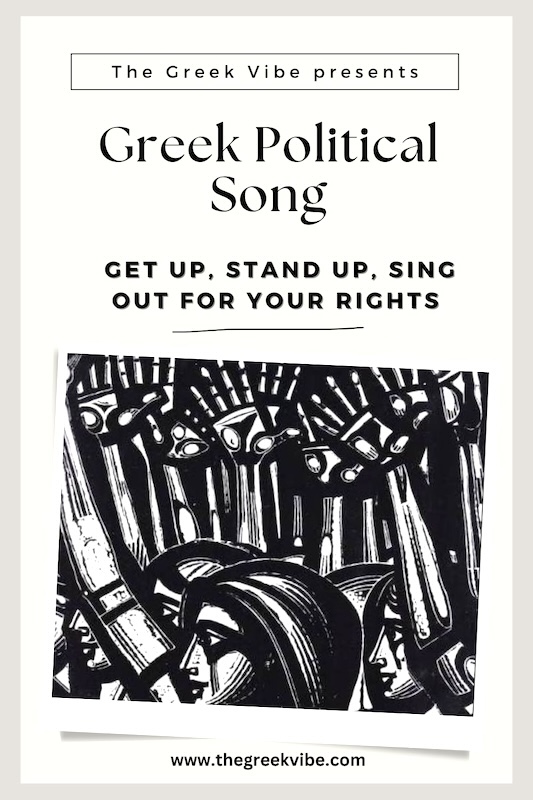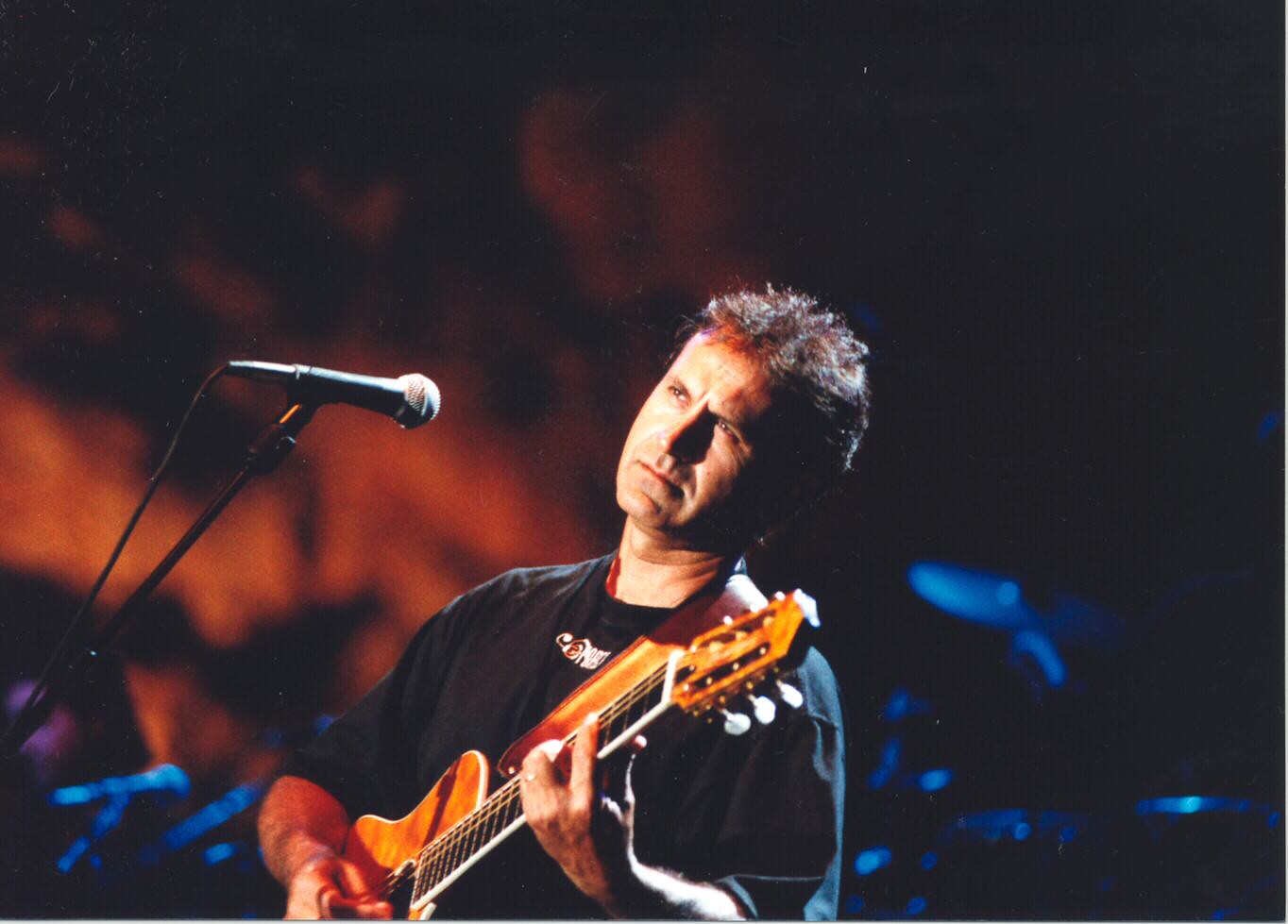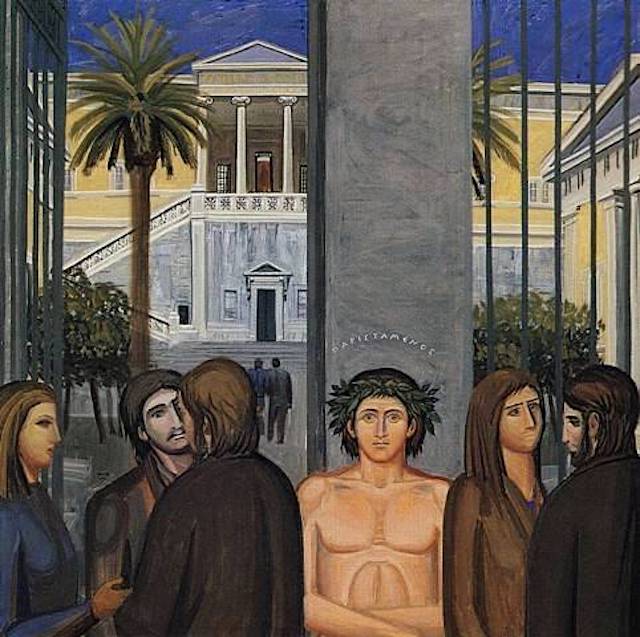
The Greek Vibe first published this post in 2012 in the midst of Greece’s debt crisis. I am re-sharing because I feel it has plenty of insight to offer the music lover and the traveler seeking to immerse in the genuine Greek experience.
Now is perhaps the most poignant of times to get an up close look at Greek political song. In this day and age, when Greece comes to the fore as the world economy’s weakest link, a verse from one of our greatest writers tells it like it is:
“…people are dying for the master’s food… Oh you victim, oh you fool, an eternal symbol, If you only wake up, at once, the world will transform”.
Kostas Varnalis
The late Cretan troubadour Nikos Xylouris delivers a gripping interpretation of Kostas Varnalis’ “Ballanda tou Kyr Mentiou” to the compelling music of Loukas Thanou in an album that was released some 40 days after Xylouris had passed away at the age of 43.
A look at Greek political song through the decades will reveal that despite the “comfortable numbness” of the modern-day Greek, singled out for being ego-centered, lazy, over-indulgent and narcissistic by the Protestant ethic-ingrained Westerners (who perhaps can only dream of such a lifestyle), the Greeks have always chosen to be deeply political even if this is only in music and in verse.
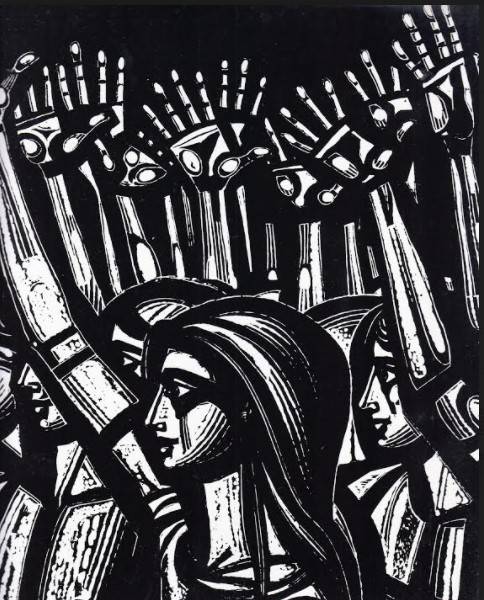
And to be honest, with such a turbulent modern history behind us – a civil war, a dictatorship – and I dare say now before us – a so-called economic crisis – we can at least admit that the voice of revolution is very much alive.
In 1975, poet and activist Yiannis Ritsos teamed up with composer Christos Leontis on an album that is as relevant today as it was back then, a year after the fall of the military junta that terrorized and punished the thinking.
The album – To Kapnismeno Tsoukali (The Smoking Pot) – is undeniably a work of musical and poetic genius. Leontis brought together traditional instruments and sounds with symphonic elements crafting a captivating whole that comes full circle with the voices of Xylouris, Tania Tsanaklidou and Vassilis Barnis.
Here Xylouris performs the chilling “Toutes tis Meres” (In These Days)
“These days the winds are hunting us down.
Barbed wire around our every glance
Barbed wire around our hearts
Barbed wire around our hopes
It’s very cold, very cold, very cold this year”
Yiannis Ritsos
Greeks Singing About the World’s ‘Wrongs’
If there is one Greek composer to have dedicated his life and work to human rights, peace and freedom then that is Mikis Theodorakis. Having himself suffered imprisonment and exile for his political beliefs, he performs here the song of the Greek resistance fighters, the ELAS, which was founded in 1942. Besides his vast range of works, Theodorakis has composed several outstanding oratorios that have left their indelible mark on Greek history and music.
The 1964 secular oratorio Axion Esti (Worthy It Is) to the verse of Greek Nobel laureate Odysseas Elytis and the 1969 “Pnevmatiko Emvatirio” (March of the Spirit) by Angelos Sikelianos are but a few. Both oratorios are odes to life and the triumph of the human spirit.
Another singer to lend his voice to the Resistance was Petros Pandis. Here in “Mavra Korakia me Nychia Gampsa” (Black Crows with Piercing Nails) off the 1974 album Songs of the Greek Resistance.
“Black crows with piercing nails
Hover over the working classes
Thirsty for blood, they furiously shriek.”
The Cypriot-born songwriter Manos Loizos made history with his 1974 album Tragoudia tou Dromou (Songs of the Road) in the mostly sung political song of modern times: “O Dromos” (The Road). To the accompaniment of a simple guitar, Loizos sings the verse of Kostoula Mitropoulou. The song has since been played at gatherings, concerts and demonstrations countrywide.
“The road had its own history to tell,
Someone had penned it on a wall with paint.
In a single word it was ‘freedom’.”
But it is not only the post-junta era that inspired songs of resistance. Throughout the conspicuous ’80s and ’90s, when the populist Andreas Papandreou used his pro-globalisation rhetoric to replace Greek ideals with Western-style habits, and later in 2000, new voices emerged armed with a different sound, less poetic lyrics but always carrying the same social message.
A diehard delegate of this era is Yiannis Aggelakas. His “Siga mi Klapso” (No, I Won’t Cry) off the 2005 album Apo Do kai Pano (From Here On Up) speaks of the fear being instilled in the youths. It is to this day the mantra of rebelling Greek youngsters and of the older restless souls across the land.
“They tell me if I leave the circle I’ll be lost,
and only within its bounds that I should wander,
and that the world is an untamed beast
and when it bites it would be wise to keep quiet.
“They tell me I’m too small to change things…
No, I won’t cry, I won’t be afraid”
Yiannis Aggelakas
Three decades later, in September 2009, as the economic crisis heats up, entechno rock band Ypogeia Revmata perform a cover of 1975 song “Tous Eho Varethei” (I’m Sick and Tired of Them) to the lyrics of Demosthenis Kourtovic and Wolf Biermann and the music of Thanos Mikroutsikos.
The band changed the lyrics to the relevant:
“And what would we lose without all of them, the Germans (previously Europeans), the professors, who would know much more if they didn’t gratify their stomachs, cowardly nine-to-fivers, portly servants… I’m sick and tired of them all…”
Rocker/activist Vassilis Papakonstantinou selected a verse penned 100 years ago to sing of the decadence of today’s political system. “To Tragoudi tis Plateias” (The Song of the Square) was written by Greek poet Georgios Souris a century ago and speaks of all the ills of the system still plaguing Greece today.
“With clerks as their guards, robbing you blind, and while they rob you in broad daylight, the thief they look to find.”
Georgios Souris
Outspoken and loud, Greek pioneering hip-hoppers Active Member tackle these “times of silence” in “Exo Ap’ Tin Porta Mas“ (Outside our Doors)
“They’re outside our door
They’re wandering
Outside our door, the cops are wandering, looking for us.
Fuming
Hide the books, if they find them, we’ll have troubles.
They beat us,
They pass by the half open window, they look inside and ask,
Where is the strange shadow they’re hunting… they alone created the shadow they’re hunting…”
This The Greek Vibe post by no means covers the range, depth and variety of Greek political song. Instead, it aims to shed some light on the revolutionary spirit of the Greek people, the dark history of the country that has inspired these works and the restless artistic forces that are at work identifying the wrongs that may one day lead to all the “rights”.
Much too much has been said, analysed and written about the Greeks and their present-day predicament. Few non-Greeks are in any position – culturally speaking – to even begin to understand the effects of their past on our present. Most “commentators” are so far off that it’s a wonder how we continue to consider them knowledgeable. It is only through the art, the poetry, the music and the duende of a people that we can begin to understand… that is when healing begins.
♪ I will conclude today’s post with a song by one the country’s most enlightened artists – Manos Hadjidakis – set to the lyrics of an equally free-thinking poet – Nikos Gatsos. The tale is about Kemal, a young prince from the East, who in his youthful impulsiveness believed he could change the world… but other is the will of Allah and of the shady souls of mankind…
The song sung here by Alkinoos Ioannidis ends with these words (of advice) from Above:
“My defeated fledgling, times do not change…
Only with fires and with knives does the world move forth.
Goodnight Kemal. This world will never change. Goodnight…”.
Nikos Gatsos
Read more about Greek music in “Greek Music 101”
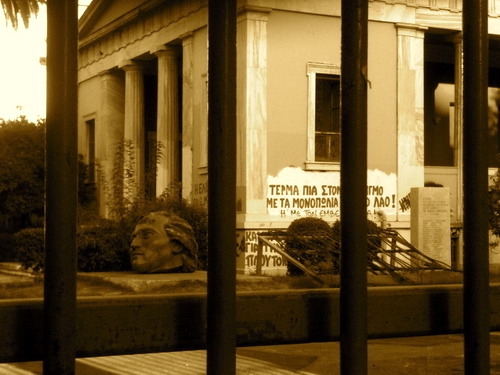
This photo was taken outside the Athens Polytechnic School, where a tank crashed through its gates during the November 17, 1973 student uprising that was to mark the collapse of the military junta. The sculpture representing the victims of the uprising is by Memos Makris.
Enjoyed this Post? Share and Pin it!
